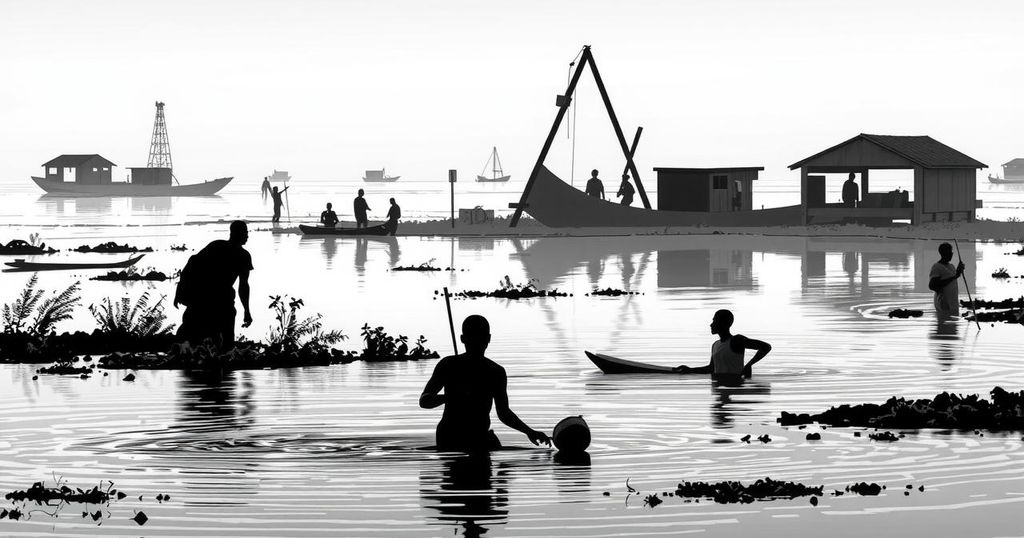Heavy rainfall has caused catastrophic flooding in Chad and Nigeria, affecting over 2.1 million individuals with significant infrastructural damage, loss of life, and displacement. Humanitarian organizations are urgently mobilizing resources to address critical needs in the affected regions, especially for children and families.
In West and Central Africa, catastrophic flooding has resulted from heavy rainfall, affecting over 2.1 million individuals and leading to more than 1,000 fatalities. The situation has compelled nearly one million people to evacuate their homes amid the destruction of hundreds of thousands of residences. Since the onset of severe rainfall in July, every province in Chad has experienced severe flooding, with the United Nations Office for the Coordination of Humanitarian Affairs (OCHA) reporting 341 deaths and over 1.5 million individuals affected. Many families have sought refuge in schools and temporary shelters as their homes have been ravaged by floods. Richard Ndoutabet Ngardoum, National Director of SOS Children’s Villages Chad, has expressed grave concerns regarding the welfare of the affected communities, particularly the most vulnerable populations. He remarked, “Community families and their children are the worst affected, and the situation is very critical. On the ground, our teams see urgent needs for shelter, food, access to drinking water, hygiene supplies, and healthcare.” The recurrent floods exacerbate poverty by devastating livelihoods and limiting access to essential services. Richard highlighted, “The loss of over 60,000 livestock and the flooding of 250,000 hectares of farmland are having a direct negative impact on food security and the livelihoods of the population.” The affected communities are now heavily dependent on humanitarian aid for survival. As the new academic year nears, the occupation of educational institutions by displaced families poses significant challenges. Richard further stated, “Temporary shelters will soon need to close, but the needs remain immense. The rainy season lasts until October, and the rain forecasts do not point to a decrease.” Infrastructural damage, including the destruction of bridges and roads, complicates the distribution of humanitarian aid, increasing the risk of epidemics such as cholera due to water contamination and inadequate sanitation. The threat of waterborne diseases, especially among children, looms large. To confront this humanitarian disaster, aid organizations are urging immediate action to support the most vulnerable populations. Richard emphasized the organization’s readiness to assist those in need, drawing parallels with the support provided during the 2022 floods. While N’Djamena has remained largely unaffected, with supply stocks established, emergency and developmental support for displaced children and families in Kousseri and Doumdoum municipalities continues. Chad’s borders with Nigeria expose both nations to the flood’s devastating impacts. Eghosa Erhumwunse, National Director for SOS Children’s Villages Nigeria, reported that approximately 600,000 individuals are suffering in Nigeria due to this crisis. He described the situation in Borno State, stating, “The devastating floods in Borno State have brought a tragic loss of life and destruction of property. Borno, a state that had begun to rebuild after years of crisis, now finds itself plunged back into humanitarian needs and emergencies. There is an urgent call for support, especially for families in our program in the Gaidamgari community, housing over 80,000 people.”
This article addresses the severe humanitarian crisis in Chad and Nigeria resulting from unprecedented rainfall and subsequent flooding that have severely impacted the lives of millions. It highlights the urgent need for humanitarian aid in response to the destruction caused by the floods and underscores the growing vulnerabilities of the affected populations, particularly children and families. The situation has been exacerbated by ongoing infrastructural damage and risks of epidemics due to contaminated water sources, necessitating immediate mobilization of resources and international support.
In summary, the catastrophic flooding in Chad and Nigeria has imposed significant hardships on over 2.1 million individuals, claiming numerous lives and displacing many from their homes. Urgent humanitarian aid is needed to address the immediate needs for food, shelter, and access to healthcare. The situation remains critical, particularly for vulnerable populations, who are increasingly reliant on aid as they navigate the ongoing challenges posed by recurrent flooding and infrastructural destruction. A collaborative effort among humanitarian organizations and the international community is essential to restore hope and assist the impacted communities.
Original Source: www.soschildrensvillages.ca






